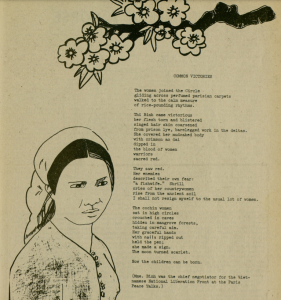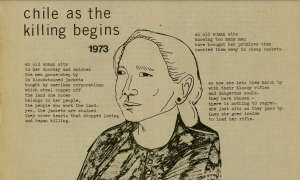Rural isolation did not keep the rural feminists of the Second Wave movement from expressing solidarity with their sisters fighting American patriarchal hegemony across the globe. Country Women’s 18th issue—this edition subtitled “Politics”—is full of discussion surrounding the various socialist and decolonial insurgent movements occurring across the Global South throughout the second half of the twentieth century. The idea of a depoliticized countryside at the time becomes even more untrue when extrapolated to countries outside of the US, where many liberation struggles arise out of rural areas. One article acknowledges the distance that is easily felt between rural American radical feminists and radical women in the global “Third World,” but cautions that it is “important to remember that this distance, in actuality, doesn’t exist” as “we are women of the country, and we are women of this world” (Julie and Weed 17). It is, in some ways, their connection to the countryside that unites these women. Wars like the Vietnam War were hardly being fought in urban areas, and, thus, rural women tended to be more immediately affected by their violences. These sentiments show that not only are rural feminists capable of connecting with the broader, urban Second Wave feminist movement; they are also capable of forging a global connection among women that share their common identities and goals.

Originally published in a collection of poetry by women of the Weather Underground, this poem, “Common Victories,” was republished in Country Women’s “Politics” issue in 1976. The poem is accompanied by line drawings of a flowering tree branch and a woman with a bandana on.
The poem “Common Victories” chronicles the life of Thị Bình, a chief negotiator and leader on behalf of the Vietnamese National Liberation Front, describing that she “came victorious / … / from prison lye, barelegged work in the deltas” (Women of the Weather Underground 35). These lines establish Thị Bình as a country woman of great merit. The title of the poem’s use of the word “common” implies that her struggles and her accomplishments can be felt and shared collectively—that it is both her hard, grueling labor and her striking successes that she holds in common with working women of the world. The poem honors the strong women that came before Thị Bình; it is stated that “she covered her mudcaked body / with crimson ao dai / dipped in / the blood of women / warriors / sacred red” (Women of the Weather Underground 35). Here, red functions as both the color of her cause, communism, and as a metaphor for the strength and the bodies of the women that allowed for Thị Bình to participate in the liberation of her lands. The evidence of her ruralness is not washed away; she remains “mudcaked” even when adorned in the áo dài. Perhaps it is her rural roots along with the support of a community of women that provides her the strength to lead a revolution. Thị Bình is portrayed as concluding that she “shall not resign [herself] to the usual lot of women” (Women of the Weather Underground 35). She refuses to accept the life that is laid out for her, refuses to perform the powerlessness that is expected of women. It is through the communal strength of the women that she has come from and that have informed her political consciousness that she is able to disobey the patriarchy and come out a potent commander.

Entitled “chile as the killing begins,” this poem, written by Devi Indigo, was published in the “Politics” issue of Country Women in 1976. A sketch of a woman gazing into the distance breaks the poem in half.
The same innate capacity for resistance is evident in Devi Indigo’s “chile as the killing begins.” The woman in the poem indicts “amerikan corporations / which steal copper off / the land she knows / belongs to her people / the people who work the land” (Indigo 18). Rural communities often feel the results of land pillaging and resource extraction more intensely, and this remains true in the coal towns of West Virginia to the copper- and lithium-rich mountains of Chile. This woman lives in the community and knows that these resources belong to the village, delineating a clear political analysis of colonial antagonisms and her place within them. This woman does not trust the men in her life to fix these large-scale problems, as she knows “too many men / have brought her promises then / carried them away in cheap caskets” (Indigo 18). Reliance upon men has only led this woman to disappointment. Some women in the country simply do not have the choice to be dependent upon men, and this can lead to various empowering experiences. This Chilean woman has a moment of reckoning with her own power as she “just sits as they pass by, / then she goes inside / to load her rifle” (Indigo 18). No longer will she sit by as her country is ravaged by imperial powers, and no longer does she trust the men to rectify this problem for her. Through loading her rifle, she is taking the power into her own hands and providing inspiration to country women suffering the effects of sexism, racism, and imperialism worldwide. Country Women’s many encounters with “Third World women” and their liberation struggles throughout the world highlight the intentional solidarity and interconnectedness between global rural women.
Works Cited:
Indigo, Devi. “chile as the killing begins.” Country Women, no. 18, Country Women Editorial Collective, 01 Jan. 1976, p. 18.
Julie and Weed. “Women of the World.” Country Women, no. 18, Country Women Editorial Collective, 01 Jan. 1976, pp. 17-18.
Women of the Weather Underground. “Common Victories.” Country Women, no. 18, Country Women Editorial Collective, 01 Jan. 1976, p. 35.
